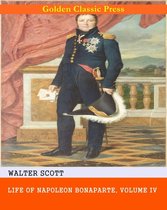Folk-Tales of Napoleon: Napoleonder from the Russian Ebook Tooltip Ebooks kunnen worden gelezen op uw computer en op daarvoor geschikte e-readers.
Afbeeldingen
Sla de afbeeldingen overArtikel vergelijken
- Engels
- E-book
- 9781613107263
- 14 februari 2023
- Adobe ePub
Honoré de Balzac
In de laatste twintig jaar van zijn leven ontpopte Balzac zich tot een van de grootste Franse schrijvers van de 19de-eeuw. Ook een van de meest productieve: in die periode voltooide hij zijn 85 romans, onder de overkoepelende titel La comédie humaine. In deze totaal-presentatie van de maatschappij gaf Balzac zowel een lengtedoorsnede van de geschiedenis vanaf de Franse Restauratie (1830 - 1850), als een dwarsdoorsnede van de verschillende sociale lagen in de samenleving.
Samenvatting
Most of the literature that has its origin in the life and career of a great man may be grouped and classified under two heads: history and biography. The part that relates to the man's actions, and to the influence that such actions have had in shaping the destinies of peoples and states, belongs in the one class; while the part that derives its interest mainly from the man's personality, and deals chiefly with the mental and moral characteristics of which his actions were the outcome, goes properly into the other. The value of the literature included in these two classes depends almost wholly upon truth; that is, upon the precise correspondence of the statements made with the real facts of the man's life and career. History is worse than useless if it does not accurately chronicle and describe events; and biography is valueless and misleading if it does not truly set forth individual character. There is, however, a kind of great-man literature in which truth is comparatively unimportant, and that is the literature of popular legend and tradition. Whether it purports to be historical or biographical, or both, it derives its interest and value from the light that it throws upon the temperament and character of the people who originate it, rather than from the amount of truth contained in the statements that it makes about the man. The folk-tales of Napoleon Bonaparte herewith presented, if judged from the viewpoint of the historian or the biographer, are absurdly and grotesquely untrue; but to the anthropologist and the student of human nature they are extremely valuable as self-revelations of national character; and even to the historian and the biographer they have some interest as evidences of the profoundly deep impression made by Napoleon's personality upon two great peoples—the Russians and the French. The first story, which is entitled "Napoleonder," is of Russian origin, and was put into literary form, or edited, by Alexander Amphiteatrof of St. Petersburg. It originally appeared as a feuilleton in the St. Petersburg "Gazette" of December 13, 1901. As a characteristic specimen of Russian peasant folk-lore, it seems to me to have more than ordinary interest and value. The treatment of the supernatural may seem, to Occidental readers, rather daring and irreverent, but it is perfectly in harmony with the Russian peasant's anthropomorphic conception of Deity, and should be taken with due allowance for the educational limitations of the story-teller and his auditors. The Russian muzhik often brings God and the angels into his folk-tales, and does so without the least idea of treating them disrespectfully. He makes them talk in his own language because he has no other language; and if the talk seems a little grotesque and irreverent, it is due to the low level of the narrator's literary culture, and not to any intention, on his part, of treating God and the angels with levity. The whole aim of the story is a moral and religious one. The narrator is trying to show that sympathy and mercy are better than selfish ambition, and that war is not only immoral but irrational. The conversation between God, the angels, and the Devil is a mere prologue, intended to bring Napoleon and Ivan-angel on the stage and lay the foundation of the plot. The story-teller's keen sense of fun and humor is shown in many little touches, but he never means to be irreverent. The whole legend is set forth in the racy, idiomatic, highly elliptical language of the common Russian muzhik, and is therefore extremely difficult of translation; but I have tried to preserve, as far as possible, the spirit and flavor of the original.
Productspecificaties
Inhoud
- Taal
- en
- Bindwijze
- E-book
- Oorspronkelijke releasedatum
- 14 februari 2023
- Ebook Formaat
- Adobe ePub
Betrokkenen
- Hoofdauteur
- Honoré de Balzac
- Tweede Auteur
- Amphiteatrof Balzac
- Hoofduitgeverij
- Library Of Alexandria
Lees mogelijkheden
- Lees dit ebook op
- Android (smartphone en tablet) | Kobo e-reader | Desktop (Mac en Windows) | iOS (smartphone en tablet) | Windows (smartphone en tablet)
Overige kenmerken
- Studieboek
- Nee
EAN
- EAN
- 9781613107263
Je vindt dit artikel in
- Categorieën
- Taal
- Engels
- Boek, ebook of luisterboek?
- Ebook
- Beschikbaar in Kobo Plus
- Beschikbaar in Kobo Plus
- Beschikbaarheid
- Leverbaar
Kies gewenste uitvoering
Prijsinformatie en bestellen
De prijs van dit product is 4 euro en 99 cent.- E-book is direct beschikbaar na aankoop
- E-books lezen is voordelig
- Dag en nacht klantenservice
- Veilig betalen
Rapporteer dit artikel
Je wilt melding doen van illegale inhoud over dit artikel:
- Ik wil melding doen als klant
- Ik wil melding doen als autoriteit of trusted flagger
- Ik wil melding doen als partner
- Ik wil melding doen als merkhouder
Geen klant, autoriteit, trusted flagger, merkhouder of partner? Gebruik dan onderstaande link om melding te doen.








